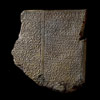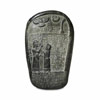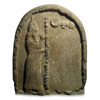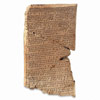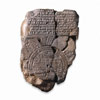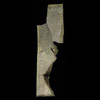
Translation of artifacts provided courtesy
of:
The British Museum 2003
|
MORE ARTICLES: VIDEO - THE FLOOD TABLET (real player format) Sumerian Culture and the Anunnaki |
From Nineveh, northern Iraq
Part of the library of King Ashurbanipal
This is one of a series of tall narrow cuneiform
tablets that tell the story of the creation of the gods Apsu and Tiamat
out of primordial waters. This particular tablet relates the episode in
which the god Anshar summons the gods to celebrate Marduk's appointment
as champion following his defeat of Tiamat.
The younger gods disturb Tiamat, and Apsu,
her husband, decides to destroy them. However, before he can act, he is
killed by the gods. Tiamat is enraged and gathers an army of monsters
and demons and marches in revenge. The gods, gathered in assembly, at
first are unable to face Tiamat. Eventually Marduk, a young god, steps
forward and offers to fight Tiamat, in return for the throne of heaven.
The gods agree and Marduk gathers his weapons. Tiamat's army is defeated
and she is killed. From her body Marduk creates the heavens and earth
and, from the blood of a defeated giant, humans are created to serve the
gods.
The Epic was recited on the fourth day
of the New Year Festival in Babylon, which took place in April. On this
day the king's right to rule was symbolically renewed by the gods. The
story probably has its origin in the second millennium BC, but was still
known in the fifth to sixth centuries AD.
Length: 21 cm
Width: 6.2 cm
Thickness: 2.5 cm
Excavated by A.H. Layard
J.B. Pritchard, Ancient Near Eastern texts
relating to the Old Testament, 3rd ed. (Princeton University Press,
1969), pp. 106-9
S. Dalley, Myths from Mesopotamia: Creation,
The Flood, Gilgamesh and others (Oxford University Press, 1991), pp.
154-62
T.C. Mitchell, The Bible in the British
Museum: interpreting the evidence (London, The British Museum Press,
1988), p. 69, no. 32
